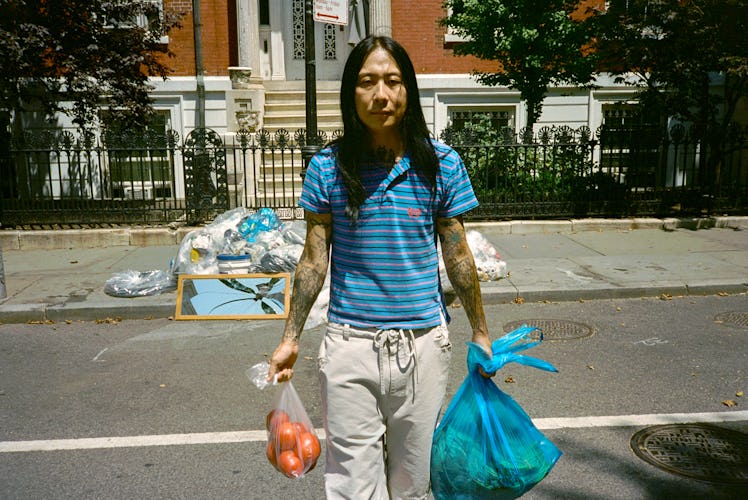Chef Danny Bowien Finds His Balance at Buddakan
With fifteen years of triumphs and missteps behind him, the Mission Chinese founder envisions a new era for a New York icon.

You’re known as the mastermind behind Mission Chinese Food, from its first iteration as a 2010 San Francisco pop-up to the versions you opened in New York. The restaurant earned you a James Beard Award and established you as one of the most creative chefs of your generation. Now, in addition to Mission Chinese’s Chinatown location, you’re revitalizing Buddakan, the nearly two-decade-old Meatpacking hot spot.
I’ve never done something like this before. In the beginning, my journey through the restaurant world was fueled by raw optimism and a lot of fear. The way I handled that was not always the healthiest. It’s interesting to be in this situation now—sober and not self-medicating in the ways that I was—having seen the full scope of how things can go wrong and how you can recover.
At Buddakan, you’re the culinary director. How has your creative process changed since the beginning of your career?
In a restaurant environment, it’s like you’re a composer: There are all of these musicians who have to execute this production you’re putting together. Musicians have a hit song; at Mission Chinese, the hit song was the thrice-cooked bacon. You have to try to outdo that. Over time you realize, Just let that be. Maybe you won’t ever outdo it, and that’s okay.
How are you approaching your work at Buddakan?
At Mission Chinese, it was: Let’s take all the risks in the world. The first thing for me with Buddakan is to balance the creative with the feasible. It’s a very different type of production; it’s like you’re trying to make a blockbuster film. I don’t want to alienate the people who are coming here already, and I want to do something that’s realistic with the staff we have. This is definitely not going to taste anything like Mission Chinese.
It’s also a much, much larger operation.
This kitchen is nearly 20 years old, and it’s designed for volume. They’re doing 1,100 covers on a Friday night. If Mission Chinese is playing at Bowery Ballroom, then Buddakan is Madison Square Garden. My goal, creatively, is to make food that stands up to this room.
You were born in South Korea, and adopted as a baby into a white family in Oklahoma. Now you’re known for your original take on Chinese food. How did those experiences inform your relationship with food?
My earliest memory was cooking, because when I got home from school, we would make dinner for my dad, who worked at General Motors. It was a lot of Hamburger Helper, meatballs, or tacos. My mom had a television set in our kitchen, and she’d be watching Julia Child or Jacques Pépin. Sometimes we’d go out to eat after church on Sundays. If I could go out to eat with my friends, the fanciest meal for me was Olive Garden. They had the never-ending pasta bowl, and I would just gorge myself, composing my own pasta combinations.
How do you know when a dish is finally good enough to put on the menu?
You have to manage the level of creativity with how feasible it is for the cooks to execute it consistently, every night. I’ve struggled with this recently at Mission Chinese. People are expecting really powerfully dialed-up dishes that are wacky, crazy combinations. I’ve been doing this for 15 years, so that’s not really what excites me as much anymore. Also, it’s not how I personally eat. Now I gravitate toward simpler food.
You’ve had multiple versions of Mission open, and they’ve closed for a variety of reasons, including a health code violation and accusations of mismanagement. What’s different now, and what have you learned?
I found it’s easier to not own a bunch of restaurants or be an operational person, but to be on the more creative side. I’m acknowledging I don’t really want to be an operator anymore. Some people are really good at it. I just couldn’t ever crack the code.
Grooming by Shaina Ehrlich for 111Skin at Born Artists.